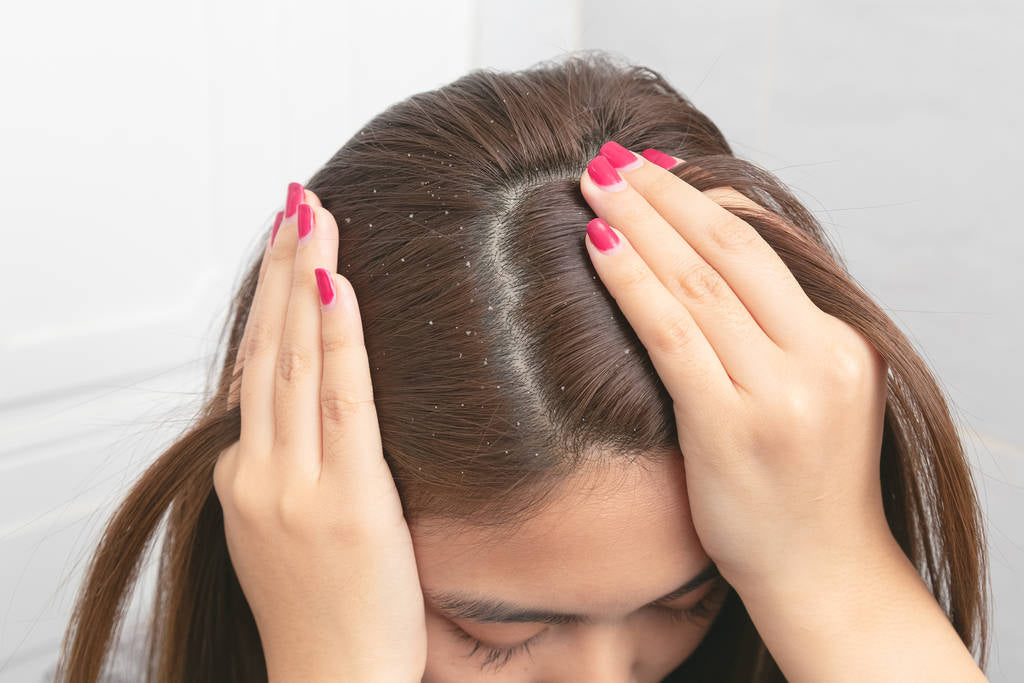
How is scalp psoriasis different from dandruff? Is scalp psoriasis a cause of dandruff? How should I treat them? These questions often arise for those struggling with persistent scalp flakiness. So, today, we’ll dig deep into the issue of scalp psoriasis vs dandruff.
Scalp Psoriasis vs Dandruff: Comparative Insights
About 30% of people worldwide experience skin issues at some point. Although these conditions are often visible, their impact is frequently underestimated.
When it comes to scalp shedding, it typically stems from either dandruff or psoriasis. The underlying causes behind each condition are quite different:
Dandruff:
- Often triggered by an inflammatory response to yeast on the scalp
- Characterised by the shedding of small skin flakes
- Annoying but rarely serious
- Responds well to specialised shampoos and consistent scalp care routines
Psoriasis:
- An autoimmune condition
- Leads to thick, scaly patches on the scalp and other body parts
- Requires a complex, multifaceted treatment for effective management
Dandruff: Zeroing in on the Details
Dandruff shows up as flaky skin that often becomes visible on clothing. It can get worse with harsh hair products or environmental factors. However, it is preventable.
Different skin tones might exhibit unique symptoms, such as lighter skin patches or distinctive lesions, which are particularly noticeable along the hairline.
Dandruff is often linked to:
- Malassezia Yeast Overgrowth: This yeast naturally lives on your scalp, but it can grow excessively and irritate the skin, leading to flaking.
- Seborrheic Dermatitis: It is a type of eczema that affects oily areas and leads to red, flaky skin.
-
Dry Skin: Dryness on the scalp can cause flakes that may be mistaken for dandruff.
Psoriasis: Discussing the Crucial Details
Unlike dandruff, psoriasis is not preventable and involves deeper immunological factors. It arises from an immune system malfunction that mistakenly attacks healthy skin cells. This accelerates skin cell growth and leads to thick, scaly patches that don’t shed normally. It may manifest at any stage of life but commonly emerges between 15 and 35 years of age. Commonly affected areas include:
- Scalp
- Elbows
- Knees
- Back
Psoriasis triggers vary from person to person. Common triggers and factors that can worsen psoriasis include:
- Infections
- Stress
- Injury to the skin
- Medications like lithium or beta-blockers
- Alcohol and smoking
- Cold, dry weather
Now, Let’s Talk About Their Overall Prevalence
Dandruff is incredibly common, affecting about 50% of people worldwide. On the other hand, psoriasis affects roughly 2-3% of the global population. While this statistic generally applies to South Africa, specific national studies with comprehensive data are very limited.
A recent study conducted in the public healthcare setting in KwaZulu-Natal showed that the most prevalent skin conditions among their patients were:
- atopic dermatitis (also called atopic eczema) (43.7%)
- psoriasis (24.8%)
- seborrhoeic dermatitis (13.4%)
Past studies at public institutions in Pretoria and Johannesburg have shown similar patterns.
How to Keep Your Scalp Healthy
Now that you have some ideas about dandruff vs psoriasis, your next concern will probably be keeping your scalp healthy. It involves understanding and addressing the specific needs of your skin condition. Here are general tips for both dandruff and psoriasis:
Dandruff Management
Understanding the appropriate ways to manage dandruff can significantly enhance comfort and control over this skin condition.
- Regular Use of Shampoos: Using exfoliating, anti-dandruff shampoos two to three times a week can help cut down on shedding.
- Specialised Conditioners: Use an anti-dandruff conditioner that works with your shampoo to control flaking, scaling, and irritation that dandruff causes.
- Controlling Oil Accumulation: Wash your hair regularly to reduce oil build-up, which can worsen scalp dryness. Comb it often along the strands to evenly spread your scalp’s natural oils.

Psoriasis Management
Due to its inherent complexity, psoriasis requires targeted medical intervention. Treatments vary based on the severity and may include:
- Topical Solutions: Several topical solutions have steroids to help reduce skin inflammation.
- Systemic Medications: These include DMARDs and biologics that target the immune system’s role in psoriasis.
- Light Therapy: This approach uses ultraviolet light to treat stubborn areas that don’t respond to other treatments.
Dandruff vs Psoriasis: Essential Factors for Accurate Diagnosis
If you’re unsure about your condition, here’s what to look for:
- Spotting Dandruff: Dandruff usually shows up as white or grey flakes on your scalp and hair. You can often spot it just by looking in the mirror at home.
- Identifying Psoriasis: Psoriasis can look similar to dandruff at first but typically has thicker, more noticeable scales. Depending on your skin tone, psoriasis may appear as salmon-coloured patches with silvery scales or violet areas with grey scaling on darker skin tones. It might also come with extra symptoms like joint pain or intense itching in other areas of your body.
- Note: If you suspect psoriasis, it’s important to see a doctor for a proper diagnosis. Psoriasis can be complex and have wider health impacts.
When to Seek Professional Help
In case home treatments aren’t providing relief, seeking professional medical advice is essential. A dermatologist can accurately diagnose whether you have dandruff, psoriasis, or another scalp condition by potentially conducting tests.
For Persistent Dandruff:
- If dandruff does not improve with regular treatment, or if the scalp shows signs of severe irritation, seek a dermatologist’s guidance.
- They might suggest stronger scalp treatments that provide enhanced effectiveness beyond typical over-the-counter products.
For Suspected Psoriasis:
- If dandruff does not improve with regular treatment, or if the scalp shows signs of severe irritation, seek a dermatologist’s guidance.
- If you experience joint stiffness or swelling, it’s important to see a rheumatologist. These symptoms might signal psoriatic arthritis, which affects about one-third of people with psoriasis.
- Your primary care physician can assist in coordinating the overall management of psoriasis and any related conditions.
Taking Control: Managing Dandruff and Psoriasis with Expert Solutions
While both scalp psoriasis and dandruff share the common symptom of a flaky scalp, they originate from distinct underlying issues and require tailored approaches for effective treatment. So, if you’re struggling with persistent scalp issues, you will benefit from accurate diagnosis and appropriate treatment. Consulting with a dermatologist can provide clarity and guide you towards the right solutions.
By being informed and proactive, you can take control of your scalp health and enhance your overall quality of life. Whether it’s the routine management of dandruff or the more complex treatment of psoriasis, the right knowledge and medical guidance can lead to significant improvements and a healthier, more comfortable scalp.
Advanced Solutions for Your Scalp Health
At DS Laboratories, we understand the complexities of scalp health and offer products designed to address various scalp concerns. Our products feature clinical-grade ingredients and an advanced Nanosome Delivery System to enhance scalp health and support hair regeneration.
Explore our collection to find solutions tailored to your needs and experience the effects of personalised care!

















